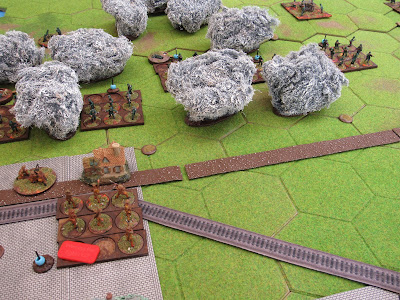Back before I allowed myself to get side-tracked into ranting at the incompetents and hypocrites who run the country, one of the last posts on here which actually mentioned wargaming addressed our habit of constantly changing the rules, often in mid-game, a subject which often prompts questions from readers. I have been wondering whether what we do could perhaps be explained in philosophical terms. Allow me if you will to make the sweeping, and not particularly accurate, generalisation that one can divide western philosophers since the middle ages into three types: religious believers for whom the Truth is handed down on tablets of stone; enlightenment thinkers for whom there is an external Truth which can be found by reason and science; and those influenced by romanticism who take the view that Truth is subjective and found within us. I do this because it seems to me that it might be valid to divide wargamers into three portions in the same way, except that instead of the search for Truth, we are talking about the search for the ideal set of rules.
Faith based wargaming is simply to accept what someone else has decided is the case. I went through that phase myself as a teenager; we probably all did. What was written in the book that I borrowed from the library must surely be right. This is an approach is very much still alive, in both historical and fantasy settings, and in the most ultra-orthodox of forms, even to the extent that in some environments one can only play if one has toys from the official supplier. I have no first hand experience, but presumably competition wargaming wouldn't work without starting from this premise. And I would argue that it's also what is being practised by those who succumb to marketing hype and adopt new sets of rules as soon as they are published, albeit probably to eventually drop them and move on to the next big thing.
Readers will no doubt have read rulebooks written by those who take the view that there is a definitive way to play wargames, which can be uncovered by the application of scientific investigation and rational analysis. If one is only precise enough about how quickly troops marched, fired, reloaded etc in real life; about the efficacy of weapons on the battlefield; about the mechanics of command and control; if one can only reconcile ground scale, figure size and unit strength; then one will end up with what is, surely, out there somewhere waiting to be discovered, namely the 'perfect' set of rules. In the introduction to his book 'The Napoleonic Wargame', G.W. Jeffrey explains the approach: "wargames rules should be nothing more than tables of facts, which are referred to in order to determine the result of situations on the battlefield".

Paddy Griffiths on the other hand writes in 'Napoleonic Wargaming for Fun' that "No one can be very dogmatic about wargames rules, because they are always a very personal thing"; which I think places him among the romantics. I would define these as those who are searching for a game that encapsulates the ousia, the essence, of the historical period involved rather than attempting to develop a simulation of it. What this group really want is something that represents the overall feel, rather than pedantically seeks (and fails) to recreate the mechanics of, the triple acies of the Punic Wars, the clouds of skirmishers of the Napoleonic period, or whatever other historical nuance it is that interests them.
So, what does this have to do with continuously changing the rules? Well, firstly, James' example of the evolution of Kriegspiel into Free Kriegspiel took place in Germany, which was the home of Romaticism, and therefore an unsurprising place to see a switch from objective to subjective 'truth' in wargaming. And, it seems to me anyway, that this last section - the romantics - is where I/we fit. Nietzsche defined Truth as "a mobile army of metaphors" which I think nicely sums up how we go about it. We try one way of looking at something, and if it doesn't work, or perhaps if we just have a feeling that there may be a better alternative, we try another way of looking at it. If you view it as a continuing project rather than an attempt to achieve a definitive result - somewhat akin to Freud's concept that we each spend a lifetime wrestling with our unique and idiosyncratic problems which will inevitably still remain unresolved when we die - then it all makes sense.


















